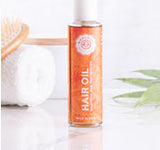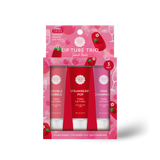Olfactory Training: Essential Oils Help You Regain Your Sense of Smell Post COVID-19

It’s been more than a year since COVID-19 was declared a pandemic, and life as we know it has completely changed. Unfortunately, for many people who contracted SARS-CoV-2 (the virus that causes COVID-19), there’s something else that hasn't returned to normal – their ability to smell!
In this article, we explore "olfactory training", a natural therapy that helps people regain the sense of smell.
COVID-19 Causes Loss of Smell in Some People
You've probably heard that one of the most common symptoms of COVID-19 is loss of smell (1). Research suggests 77% of COVID-positive people lose their sense of smell (2). One study found that, even after two months, 24% still haven't recovered this important sense (3). Some experience a complete loss of smell (also known as anosmia), while others may only have a partial loss of smell (or hyposmia).
Loss of smell is relatively common with respiratory viruses due to congestion and nasal inflammation – but it returns to normal fairly quickly. Doctors still don't know why this symptom is so prevalent in COVID-19 patients. However, it may be due to damage to the olfactory neurons, which results in scrambled messages being sent from smell receptors in the nose to the brain.
This symptom can be devastating as smell is intrinsically linked to taste, enjoyment of food, appetite, memory, and emotions. Research has found people with anosmia are less likely to enjoy food and are at higher risk of depression and anxiety (4). Plus, you need a sharp sense of smell for safety; without it, you could miss a gas leak, a fire, or rotten food.
What Is Olfactory Training?
Olfactory training, or smell training, is a rehabilitative protocol that helps people to regain their sense of smell after an illness or injury. It involves smelling four different scents twice daily and is useful for those with long-term loss of smell from COVID-19. Research suggests it strengthens the connection between olfactory nerves and the brain.
Do Essential Oils Help with Olfactory Training?
Essential oils are natural plant extracts that make ideal tools for olfactory training. They have potent, stimulating aromas and tend to have one dominant scent, as opposed to perfumes which have different scent combinations. In studies, essential oils used to treat loss of smell include rose, eucalyptus, lemon, and clove (5). However, many other oils are suitable. Our Woolzies Favorites Collection and Premium Collection are great options for creating the best smell training kit. Each of these sets has a selection of 6 popular single scent oils.
Step-by-Step Guide to Olfactory Training Using Essential Oils
This science-based practice is easy and safe to do in the comfort of your own home. You'll need four essential oils that represent each of the following scents: floral, fruity, spicy, and herbal. You'll also need some cotton pads.
Step 1: Sprinkle 2-3 drops of the oil onto a cotton pad and let the aroma develop for a minute.
Step 2: Bring the pad to your nose and inhale the scent for 20 seconds with a series of short "bunny sniffs". As you do this, visualize and conjure up memories of the aroma. For example, if you are smelling peppermint oil, immerse yourself in the memory of your toothpaste, a cup of peppermint tea, or mint chewing gum.
Step 3: Take a 30-second pause.
Step 4: Repeat steps 1-3 until you have used all four oils.
Do this twice a day for at least 3 months, or until your sense of smell has returned to normal. It's important to do this exact process daily as repetition helps to rewire the brain.
It's also recommended that you switch scents every twelve weeks. A 2015 study found that those who changed scents after three months when practicing olfactory training had better results than those who used the same scents (6).
How Long Will It Take For Sense of Smell to Return?
Olfactory training isn't a quick fix; don't be discouraged if you don't smell anything after one day, one week, or even one month. Keep going! Experts recommend engaging in olfactory training daily for three to four months. Additionally, studies show that it’s most effective when started within a year of symptom onset (7).
It's a good idea to keep a diary to track your progress, help you notice positive changes, and stay motivated.
Final Thoughts
Whether you or someone you know is suffering from long-term symptoms, please share this article to help others who may be in the same boat!
Please note: olfactory training is recommended by medical doctors, but if your loss of smell persists please speak to your doctor to rule out other potential causes.
Resources
1. https://www.ncbi.nlm.nih.gov/pmc/articles/PMC7386529.1/
2. https://academic.oup.com/chemse/article/45/9/865/5912953
3. https://onlinelibrary.wiley.com/doi/10.1111/joim.13209
4. https://academic.oup.com/chemse/article/39/8/711/2908178
5. https://onlinelibrary.wiley.com/doi/abs/10.1002/lary.20101
6. https://onlinelibrary.wiley.com/doi/abs/10.1002/lary.25245
7. https://onlinelibrary.wiley.com/doi/abs/10.1002/lary.24340
Suggested Posts
Tips and Tricks for Dealing with Anxiety and Panic Attacks
Racing heart? Fearful thoughts? Chest tightness? These are all hallmarks of anxiety and panic disorder. If you're struggling with debili...
Focus on: Cedarwood Essential Oil
Are you looking for a warming essential oil with a woody aroma and grounding properties? Woolzies Cedarwood Essential Oil has a beautifu...




